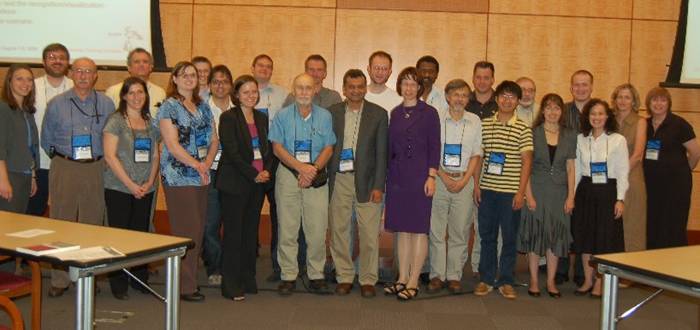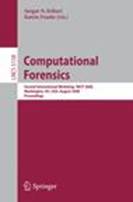|
It was a great honor for the organizers to host the scientific event at the renowned National Academy of Sciences: Keck Center. Computational Forensics is a quantitative approach to the methodology of forensic sciences. It is an emerging interdisciplinary research domain that is rooted in pattern recognition algorithms and associated statistical methods of data analysis. It is also understood as the hypothesis-driven investigation of a specific forensic problem using computers, with the primary goal of discovery and advancement of forensic knowledge. CF works towards · in-depth understanding of a forensic discipline, · evaluation of a particular scientific method basis, and · systematic approach to forensic sciences by applying techniques of computer science, applied mathematics and statistics. The Computational Forensics workshop series is intended as a forum for researchers and practitioner in all areas of computational and forensic sciences to discuss current challenges in computer-assisted forensic investigations and to present recent progress and advances. IWCF addresses a broad spectrum of forensic disciplines that use computer tools for criminal investigation. This year’s edition covered presentations on computer-based 3D processing and analysis, as for example virtual autopsy and anthropology, shoe print preprocessing and analysis, computational methods for individuality studies, natural language analysis and information retrieval to support law enforcement, analysis and group visualization of speech recordings, scanner and print device forensics, computer-based questioned document and signature analysis. In total, 39 papers from 13 countries were submitted to IWCF 2008, of which 19 (48%) were accepted. We appreciated the number of papers submitted and the diversity of the topics covered. We regret that not all manuscripts could be accepted for publication. The review process was a delicate and challenging task for the Program Committee. We are especially grateful to the 19 internationally established forensic and computational science experts who supported the IWCF as members of the Program Committee. In particular, their encouragement, advice, and active contribution ensured the high scientific standard of the workshop. The IWCF workshop was fashioned around dialogue, not just presentation. Each presentation was followed by an extensive discussion providing guidance and inspiration for the benefit of the researchers. In particular, the different backgrounds of workshop participants supported controversial discussions from various points of view and hence scientific discourse. This stimulating atmosphere served as a basis for fruitful panel discussions on the future of computational forensics as a research discipline. As a result of these discussions, and more importantly to promote active cooperation and exchange among researchers around the world, a mailing list was established for announcements related to computational forensics. Researchers, developers and students are welcome to join us at groups.google.com/group/compfor. The organization of such an event is not possible without the effort and the enthusiasm of the people involved. We therefore thank all members of the Local Organizing Committee. Our special thanks goes to Eugenia H. Smith for coordinating the entire organization of the event. Each ending is also a new beginning. We are now looking very much forward to the Computational Forensics workshop 2009. It will be hosted at the Netherlands Forensics Institute (english.forensischinstituut.nl/ ). You are welcome to join us in The Hague, August 20-21, 2009. Please check the IWCF2009 website of more detailed information (iwcf2009.arsforensica.org). |
|
Workshop Report: IWCF 2008 |
|
Report prepared by the Workshop Chairs |



|
Proceedings of the workshop have been published by Springer-Verlag in Lecture Notes in Computer Science Series (volume number 5158).
The proceedings are also available online at the publisher’s web site.
Click on the image to go to the publisher’s web site for this volume. |

